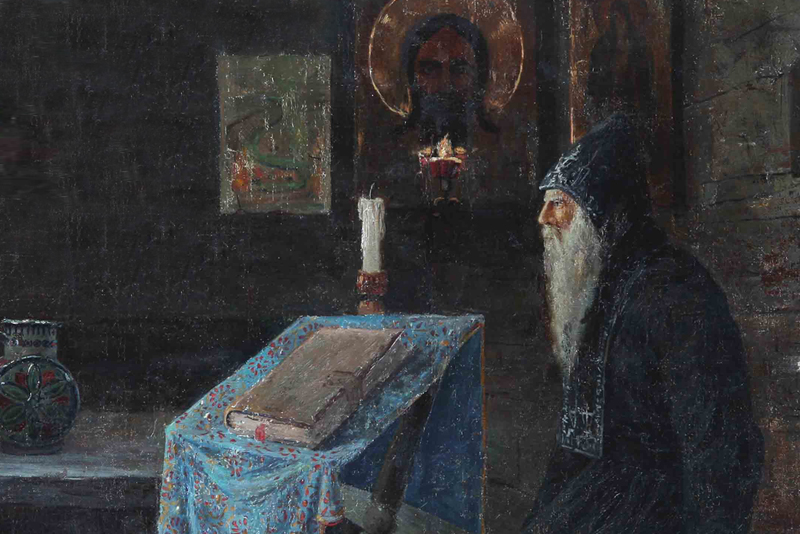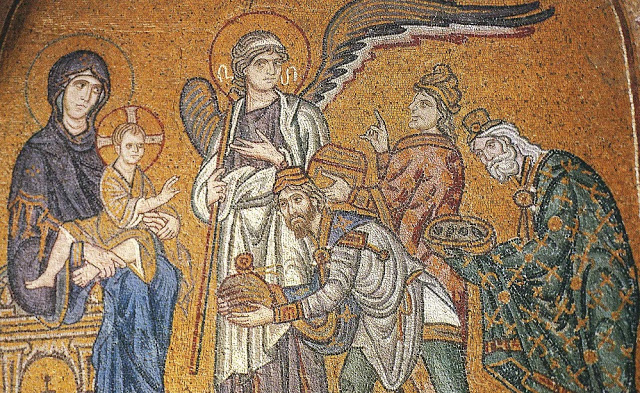
Good disposition is the affection or love for a certain kind of good deeds which lies at the core of doing them. Humility, for example, is described as a virtue, but it is not a specific act, but an innermost attitude that can be seen in all humble deeds. Likewise, patience, meekness, selflessness, and obedience are also known as virtues, and yet they are not something specific; rather, they are something hidden in their respective deeds and are the foundation of these deeds – something that is constantly in the heart, ingrained in it, that is, the unceasing love of these deeds. These good dispositions are in fact the essence of virtue. A calm person is not the one who doesn’t scold his offender but the one who does not have malice in his heart.
Saint Theophan the Recluse
Imagine two ladders: one goes upwards, to Heaven, while the other leads down to Hell, and you stand on the ground halfway between the two ladders. Don’t think or say, “How can I fly off the ground and suddenly find myself at the height of the heaven, i.e. at the top of the ladder?” That is impossible, and God does not demand it from you; but at least be careful not to go down. Do not do evil to your neighbor, do not upset him, do not slander, do not denigrate him, do not speak evil, do not reproach him, and thus you will begin to do good to your brother little by little, by comforting him with your words, sympathizing with him, or giving him what he needs; and thus, climbing from one step to the other, you will reach the top of the ladder with God’s help. For by helping your neighbor little by little, you will reach the point at which you will seek his benefit as your own and his success as your own. This is what it means to love your neighbor as yourself.
Abba Dorotheus
If you do your best to be a virtuous man and don’t feel like you’re getting anything out of it, don’t be surprised. For until a man humbles himself, he does not receive rewards for his work. The reward is not for doing things, but for humility. Whoever hurts the latter loses the former. Those who have already received a reward for good deeds prevail over those who are in the process of doing good deeds. The virtue is the mother of sorrow, and the sorrow gives birth to humility and humility brings forth grace. However, the reward is neither for your virtue nor for your efforts, but for your humility. If it wears off, the first ones (the virtue and the effort to achieve it) will be in vain.
Saint Isaac the Syrian
Only the virtue that is acquired freely, without coercion from outside, is of value. A person should feel the virtue as a necessity and then work hard to acquire it. It is not God who needs us to do His will, but us. We need to do God’s will to be free from our old self. All the energy of a believer should be directed at keeping the commandments of God to the dot. When a man strives to do God’s will, he draws near to God and obtains divine grace even if he does not ask for it. In other words, he draws water directly from the source.
Saint Paisius the Hagiorite
We know that if a fasting person adds something of his own will to it or fasts in order to obtain fame and benefit, his fasting can be an abomination to God. The Israelites also fasted, but because they were hurting each other and doing what they pleased, God rebuked them through the Prophet Isaiah, saying, Is it such a fast that I have chosen? (Isaiah 58:5), for the mouth of the LORD hath spoken it (Isaiah 40:5). Same here: Any good deed, which is not motivated solely by love for God, but is accompanied by one’s own will, is unclean and unpleasant to God. This can also be learned from the Divine Law which says, Thou shalt not sow thy field with mingled seed: neither shall a garment mingled of linen and woollen come upon thee (Leviticus 19:19). And if you want to make sure that it refers to us who work in the Lord’s field, then notice how Ecclesiastes points to it, saying: Let thy garments be always white (Ecclesiastes 9:8), showing that this work must always be clean. If, however, something is mixed in with the cause according to the personal will of the doer, it is already defiled and not acceptable to God. The Lord said to His disciples, Beware of false prophets, which come to you in sheep’s clothing, but inwardly they are ravening wolves. Ye shall know them by their fruits. Do men gather grapes of thorns, or figs of thistles? (Matthew 7:15, 16). So, let us try to do God’s work not for the sake of something else, but only for the sake of God. If this is not the case, then God does not need us to carry out the work through us, for God will never have a lack of someone who will carry out His work blamelessly. So, in doing good, let us be watchful over ourselves, so that we might not make our work useless in any way because of our own will.
Saint Barsanuphius the Great
Translated by The Catalogue of Good Deeds
Source: https://obitel-minsk.ru/chitat/den-za-dnyom/2019/svyatye-otcy-o-dobrodetelyax



